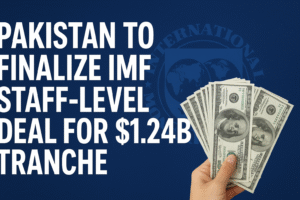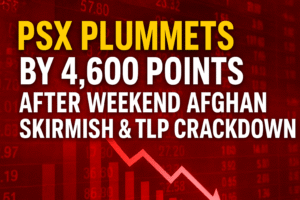Pakistan Sends First Shipment of Rare Earth Minerals to U.S. Under $500M Deal
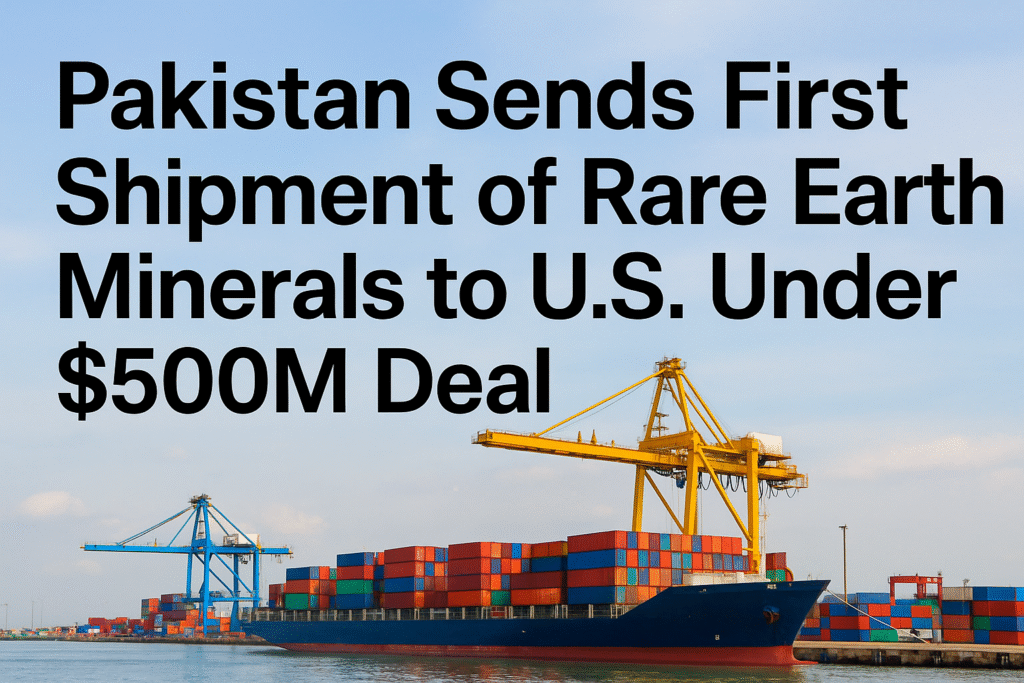
Introduction
In a landmark development that could redefine Pakistan’s economic and diplomatic landscape, the country has officially dispatched its first shipment of rare earth and critical minerals to the United States under a $500 million agreement. The move marks a historic milestone in Pakistan’s bid to diversify exports, attract foreign investment, and position itself as a significant player in the global supply chain for critical minerals—especially those essential for advanced technologies and defense manufacturing.Pakistan rare earth shipment Pakistan U.S. mineral deal rare earth minerals Pakistan USSM Pakistan MoU Pakistan critical minerals export Pakistan mineral diplomacy U.S. investment in Pakistan mining
The inaugural shipment includes copper concentrate, antimony, and a selection of rare earth elements such as neodymium and praseodymium. The agreement was signed between Pakistan’s Frontier Works Organization (FWO) and the Missouri-based US Strategic Metals (USSM). paktstan send first Pakistan rare earth shipment Pakistan U.S. mineral deal rare earth minerals Pakistan USSM Pakistan MoU Pakistan critical minerals export Pakistan mineral diplomacy U.S. investment in Pakistan mining
This deal represents more than just a trade arrangement—it symbolizes Pakistan’s growing strategic relevance in an era defined by resource competition, global power shifts, and economic transformation.
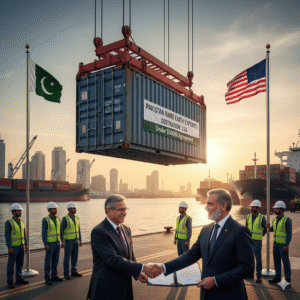
Understanding Rare Earths and Critical Minerals
What Are Rare Earth Elements (REEs)?
Rare earth elements are a group of 17 metallic elements that are indispensable to modern industries. They are used in producing high-strength magnets, electric vehicles, wind turbines, smartphones, military radars, guided missiles, satellites, and semiconductors.
Despite their name, these elements are not necessarily rare in abundance; rather, they are difficult and costly to extract and refine. The process requires advanced technology, environmental controls, and extensive infrastructure.
Why They Matter Globally
Rare earths and critical minerals have become the “new oil” of the 21st century. The world’s dependence on China—currently processing nearly 70% of the world’s rare earths—has caused nations like the U.S., Japan, and European countries to seek alternate sources to diversify supply chains.
Pakistan’s entry into this global market could significantly shift regional dynamics, especially in South Asia, where mineral competition is intertwined with strategic rivalries and economic ambitions.
Pakistan’s Untapped Mineral Wealth
Pakistan’s mineral potential is immense yet largely underdeveloped. Geological surveys have identified rich deposits of copper, gold, lithium, antimony, tungsten, and rare earth elements, primarily in Balochistan, Khyber Pakhtunkhwa, and Gilgit-Baltistan.
Experts estimate that Pakistan’s untapped mineral wealth could exceed $6 trillion in value. However, due to governance issues, security challenges, limited infrastructure, and inadequate investment, this potential has remained dormant for decades.
The new partnership with the United States offers Pakistan an opportunity to convert its natural resources into sustainable economic growth and technological advancement. Pakistan rare earth shipment
Pakistan U.S. mineral deal rare earth minerals Pakistan USSM Pakistan MoU Pakistan critical minerals export Pakistan mineral diplomacy U.S. investment in Pakistan mining
Details of the $500 Million Deal
The MoU Between FWO and USSM
In September 2025, Pakistan’s Frontier Works Organization—an engineering arm of the military—signed a Memorandum of Understanding (MoU) with US Strategic Metals (USSM). The agreement is valued at approximately $500 million and focuses on the exploration, extraction, processing, and export of critical minerals.
Under the agreement, both sides have pledged to establish a complete mineral value chain, including refining facilities within Pakistan. The long-term goal is to move from raw material exports to domestic value addition, creating jobs, technology transfer, and industrial capacity.
First Shipment Details
The first consignment, which was dispatched in early October 2025, contains samples of copper concentrate, antimony, and rare earth elements. The shipment represents the initial phase of a broader export program that will expand once large-scale extraction begins.
This milestone demonstrates Pakistan’s seriousness in diversifying its exports beyond traditional sectors such as textiles and agriculture, while also signaling a growing economic partnership between Islamabad and Washington. paktstan send first Pakistan rare earth shipment Pakistan U.S. mineral deal rare earth minerals Pakistan USSM Pakistan MoU Pakistan critical minerals export Pakistan mineral diplomacy U.S. investment in Pakistan mining
Strategic Importance of the Deal
For Pakistan
-
Economic Diversification:
Pakistan’s export economy has long relied on textiles, rice, and remittances. The entry into mineral exports can provide a much-needed boost to the foreign exchange reserves and stabilize the national economy. -
Industrial Development:
The project includes plans for a poly-metallic refinery within Pakistan, allowing the country to process minerals locally instead of exporting raw ore—creating jobs and technical expertise. -
Geopolitical Leverage:
With critical minerals becoming central to defense and technology industries, Pakistan can now position itself as an emerging supplier in a field dominated by a few nations. This enhances its diplomatic bargaining power. -
Infrastructure Growth:
The mining agreement is expected to spur investment in roads, ports, energy, and logistics, particularly in mineral-rich regions like Balochistan.
For the United States
-
Reducing Dependence on China:
The U.S. has been actively seeking non-Chinese suppliers for rare earth materials. Pakistan’s mineral wealth offers an alternative, strengthening American supply chain security. -
Expanding Geostrategic Influence:
Strengthening economic ties with Pakistan allows the U.S. to maintain influence in South Asia amid China’s growing presence through the China-Pakistan Economic Corridor (CPEC). -
Strategic Partnership:
Beyond minerals, this deal opens pathways for broader collaboration in technology, green energy, and industrial development.
Domestic Political Reactions
Government’s View
The Government of Pakistan has hailed the deal as a breakthrough that will bring sustainable economic growth and job creation. Officials emphasize that the agreement is based on mutual benefit and national interest, ensuring that Pakistan retains control over its natural resources.
Opposition Concerns
Opposition parties, particularly Pakistan Tehreek-e-Insaf (PTI), have demanded transparency regarding the deal’s terms. They argue that all contracts involving natural resources should be subject to parliamentary oversight and public scrutiny to avoid any potential misuse or loss of national sovereignty.
Critics have also raised concerns about whether the profits will equitably reach provinces like Balochistan, where most mineral reserves are located.
Challenges and Risks
While the deal represents a major opportunity, it also carries substantial risks.
1. Governance and Transparency
Historically, resource deals in Pakistan have faced issues of mismanagement, corruption, and lack of oversight. Transparent licensing, revenue sharing, and public reporting will be essential to ensure the country benefits fairly from the mineral boom.
2. Environmental Concerns
Rare earth extraction is highly chemical-intensive and can cause radioactive waste and groundwater contamination. Without strong environmental safeguards, Pakistan risks damaging its ecosystems and local livelihoods.
3. Security and Logistics
Most mineral-rich areas, such as parts of Balochistan, are vulnerable to insurgent activity. Ensuring the safety of mining operations and transportation routes will be a major challenge.
4. Geopolitical Balancing
While the U.S. partnership brings economic benefits, it may also strain ties with China, which remains Pakistan’s largest investor. Islamabad will need to maintain a delicate balance to avoid alienating either side.
5. Technical Capacity
Pakistan currently lacks large-scale refining technology and skilled manpower for high-end mineral processing. Significant investment in training and technology transfer will be required to make the venture sustainable.
The Road to Industrialization
The establishment of a poly-metallic refinery under this MoU could be a game-changer for Pakistan. Local refining will help the country move up the global supply chain, retain higher profits, and create thousands of technical jobs.
Furthermore, the government’s focus on “Mineral-to-Market” strategies aims to create industrial zones and special economic hubs dedicated to mining and mineral processing.
If implemented effectively, Pakistan could evolve from a raw material exporter into a regional mineral hub connecting Central Asia, the Middle East, and South Asia.
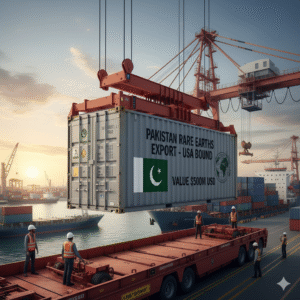
Environmental and Social Responsibility
Mining development cannot come at the cost of the environment and communities. Pakistan’s environmental laws must evolve to address waste management, chemical safety, and water protection.
Local communities must be integrated into the development framework. Social compensation, job quotas, and infrastructure benefits (schools, hospitals, clean water) will help ensure inclusive growth and reduce regional grievances.
Global Context and Geopolitical Dynamics
Pakistan’s mineral diplomacy comes at a time of growing global competition for strategic resources. The U.S., Europe, and Japan are all investing heavily in supply diversification, while China continues to dominate the global rare earth refining market.
The move also mirrors similar agreements seen across Africa and Latin America, where nations are leveraging their mineral reserves to attract investment and enhance global partnerships.
Pakistan’s deal with the U.S. places it squarely in this new geopolitical chessboard of resource security and strategic alliances. paktstan send first Pakistan rare earth shipment Pakistan U.S. mineral deal rare earth minerals Pakistan USSM Pakistan MoU Pakistan critical minerals export Pakistan mineral diplomacy U.S. investment in Pakistan mining
Economic Impact and Future Potential
If managed effectively, this mineral partnership could:
-
Generate billions in annual export revenue within the next decade.
-
Create tens of thousands of skilled jobs in mining, refining, and logistics.
-
Strengthen Pakistan’s foreign reserves and reduce its trade deficit.
-
Stimulate regional development, particularly in Balochistan and Khyber Pakhtunkhwa.
-
Attract global investors seeking stable, diversified mineral sources.
However, achieving this vision will require policy consistency, political stability, and transparent management.
Expert Opinions
Economic analysts have noted that this deal is both a symbolic and structural turning point. Symbolic, because it restores investor confidence; structural, because it initiates the process of industrial diversification that Pakistan has needed for decades.
Experts emphasize that the success of this project depends on the government’s ability to implement long-term policy frameworks rather than short-term political objectives.
The Road Ahead
The first shipment of rare earth minerals marks the beginning of a new era in Pakistan’s economic history. While challenges remain, the potential rewards are immense. If the government ensures transparency, environmental care, and equitable development, Pakistan could become a major player in the global mineral market.
The key will be institutional discipline, technological capacity, and international collaboration.
✅ Conclusion
The $500 million rare earth minerals deal with the United States has opened a new frontier for Pakistan’s economy. The first shipment is a milestone that symbolizes the country’s ambitions to enter the modern industrial age and participate in global technology supply chains.
But success will depend on whether Pakistan can balance its geopolitical interests, safeguard its sovereignty, and build sustainable industrial capacity. Pakistan rare earth shipment.
Pakistan U.S. mineral deal rare earth minerals Pakistan USSM Pakistan MoU Pakistan critical minerals export Pakistan mineral diplomacy U.S. investment in Pakistan mining paktstan send first Pakistan rare earth shipment Pakistan U.S. mineral deal rare earth minerals Pakistan USSM Pakistan MoU Pakistan critical minerals export Pakistan mineral diplomacy U.S. investment in Pakistan mining


